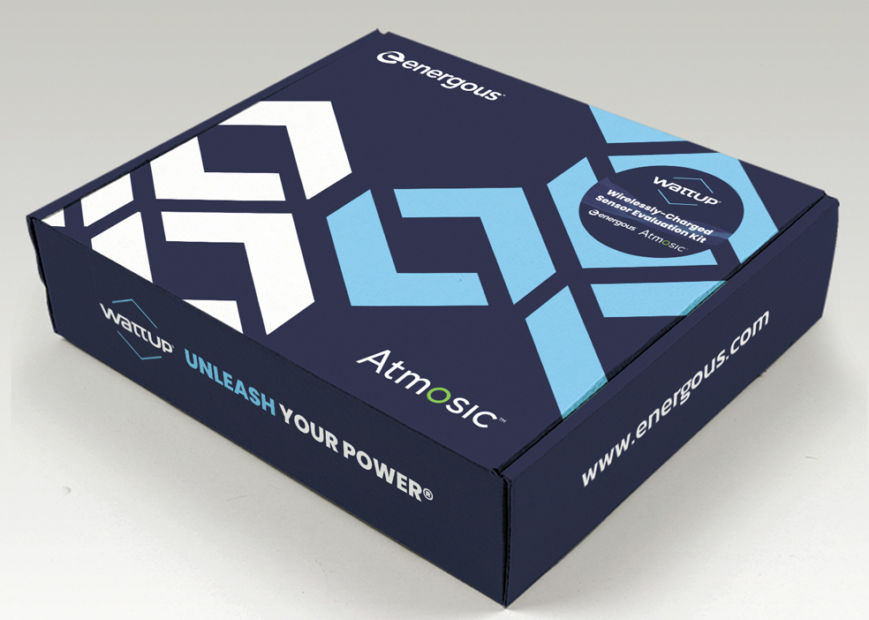Kit helps developers power IoT devices wirelessly
- July 13, 2022
- Steve Rogerson

A wirelessly-powered sensor evaluation kit combines the technologies from Californian companies Energous and Atmosic.
The kit highlights the capabilities of wireless power and helps IoT device developers deploy wireless power networks for the expanding IoT ecosystem.
Energous is a developer of RF-based charging for wireless power network, and Atmosic Technologies is an innovator in energy harvesting wireless systems-on-chip (SoCs) and modules for the IoT.
The kit uses Atmosic’s ATM3 energy harvesting Bluetooth Low Energy (BLE) SoC and Energous’ FCC-certified 1W WattUp PowerBridge transmitter. Kits will begin shipping later this month.
An out-of-the-box battery-free sensor provides IoT device developers with the ability to explore how wireless power transfer can support devices such as sensors and tags, enabling IoT deployments that are not reliant upon replaceable batteries or power cables but are instead powered wirelessly over-the-air.
“Without reliable power, IoT devices in any application are significantly limited in their capabilities and value, and the billions of replaceable batteries and charging wires powering most of today’s internet-connected devices fail to meet their growing power requirements,” said Cesar Johnston, CEO of Energous. “Along with Atmosic, we’re thrilled to announce the availability of our evaluation kit, which gives IoT device developers a low-cost solution to reduce device dependency on unreliable power sources and reliably power billions of IoT devices wirelessly.”
The number of IoT devices is projected by IDC to more than triple over the next three years, growing from about 12 billion devices today to almost 40 billion by 2025. All these devices require consistent and reliable levels of power to function properly, however most are currently fuelled by replaceable batteries, which are impacted by variables including temperature and frequency of use, or by cumbersome power cables and cords that bring with them logistical problems and additional hidden costs to IT teams and their budgets.
The kit is designed to help alleviate many of the most pressing problems with the large-scale wireless IoT sensor deployments by removing the need for batteries or power cables and the long-term maintenance overhead required to maintain them in busy commercial, retail and industrial environments. It includes two Bluetooth LE RF harvesting sensor modules that transmit real-time temperature, humidity and acceleration readings to the Energous WattUp application while operating from energy harvested from the WattUp transmitter, making this suitable for applications including retail operations and industrial IoT.
“Advanced IoT deployments are too often stunted due to concerns around implementation costs and battery maintenance, two challenges that now have a clear solution and are addressed through our evaluation kit with Energous,” said Srinivas Pattamatta, vice president at Atmosic Technologies. “Energous’ FCC-certified 1W transmitter combined with our BLE power harvesting capabilities now make over-the-air wireless power transfer possible for many IoT applications, such as electronic shelf labels, access control or IoT sensor beacons.”
The kit includes one Energous 1W WattUp transmitter, two Atmosic energy harvesting sensor modules, and a mobile application for sensor monitoring and transmitter control.
The kit’s sensors are designed around the Atmosic ATM3202 Bluetooth LE SoC with integrated RF energy harvesting. Sensors provide temperature, humidity and acceleration information to a mobile application via Bluetooth LE. Sensor design information can be provided to support customisation and integration of other sensor types.
An integrated multistage RF harvesting rectifier with MPPT (maximum power point tracking) algorithm increases harvesting performance over the input range.
The sensor consumes approximately one quarter the power consumption of a typical Bluetooth LE beacon, increasing the amount of functionality (sensor reads and reporting interval) for a given amount of power.
The energy harvesting BLE module with integrated flash supports rapid development and device integration in a small form factor.
The kit is priced at $500.




